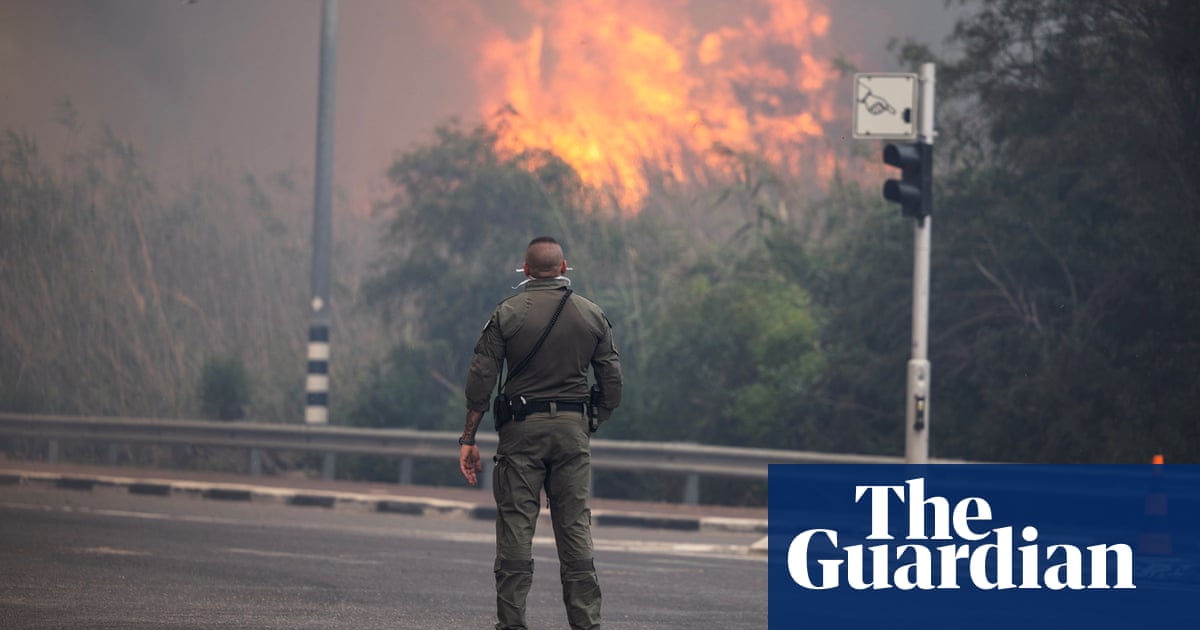The Israeli prime minister,Benjamin Netanyahu, has warned that rapidly spreading wildfires near Jerusalem could reach the city, as he declared the situation a “national emergency”.
Thick smoke billowed above highways near Jerusalem on Wednesday as firefighters rushed to control wildfires that have injured several people and prompted the military to deploy troops to help.
Israel’s Magen David Adom (MDA) rescue agency reported that hundreds of civilians were at risk from the worst fires in years.
MDA said it had provided treatment to around 23 people, 13 of whom were taken to hospital, the majority suffering from smoke inhalation and burns. Among them were two pregnant women and two infants under a year old, it added.
It said the alert level had been raised to the highest tier.
Speaking from near the city of Modiin as fires burnt on a nearby hillside, resident Yuval Aharoni, 40, said: “It’s just very sad because we knew the weather, we kind of knew that would happen and still we feel like they weren’t ready enough with the big planes that can drop large amounts of water.”
Netanyahu warned that “the western wind can push the fire easily towards the outskirts of [Jerusalem] – and even into the city itself.
“We need to bring as many fire engines as possible and create firebreaks well beyond the current fire lines ... We are now in a national emergency, not just a local one,” he said in a video statement on Wednesday. “The priority right now is defending Jerusalem,” he added.
Police closed the main Jerusalem-Tel Aviv highway and evacuated residents along the route as brushfires broke out again in an area ravaged by blazes a week ago. Communities housing thousands of people have been cleared out.
“A lot of police arrived, a lot of firefighters, but it didn’t really help. The fire had already completely taken over the whole area here,” student Yosef Aaron told AFP, speaking on the side of a highway with flames visible in the distance.
Fire chief Eyal Caspi warned at a televised press conference that “our aircraft can’t do anything right now due to the weather conditions... Our goal is to save lives”.
“We are apparently facing the largest fire inIsraelin a decade.”
The police said on X that they had deployed in force around the Jerusalem-Tel Aviv highway and the Jerusalem Hills, asking the public to “avoid travelling to the area”.
An AFP journalist at the scene earlier on Wednesday said the blaze was sweeping through wooded areas near the main road between Latrun and Bet Shemesh, and that helicopters were working to extinguish the flames.
Soldiers arrived on the scene mid-afternoon, with many drivers abandoning their vehicles to flee the fire.
Communities located about 30km (19 miles) west of Jerusalem were evacuated, Israeli media reported, airing images of firefighting teams battling fierce flames.
National security minister Itamar Ben Gvir hinted that arson could be behind the fires. Police said they had arrested a resident of east Jerusalem who was caught “attempting to set fire to a field in the southern part of the city”.
There was no official declaration directly linking the two.
MDA said ambulance teams had been positioned near communities close to the fires and were ready to provide medical treatment and assist residents.
High temperatures and strong winds have allowed the fires in wooded areas to spread quickly, prompting evacuations from at least five communities, the police said in a statement.
Ben Gvir, who oversees Israel’s fire department, visited the affected area, which is prone to wildfires at this time of year.
In a video statement, he said work was being done to bring more assistance to the affected areas and evacuate stranded civilians.
The foreign ministry has contacted nearby countries including Greece, Cyprus, Croatia, Italy and Bulgaria for assistance.
Netanyahu’s office said three aircraft would arrive soon from Italy and Croatia to help fight the fires.
